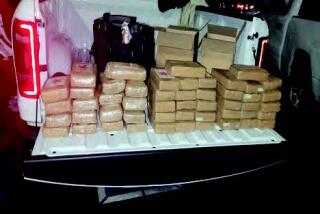$3-Million Drug Case Dropped After Police Botch Search
- Share via
A federal judge has ruled that police bungled the search last December of a Bell Gardens apartment in which nearly $3 million in cash from drug proceeds was discovered. He ordered charges against five defendants in the case dropped.
At the time, the case--which involved officers from the cities of Huntington Park and Bell and Bell Gardens--was seen as a breakthrough in disrupting the money-laundering activities of Colombian drug dealers in the Los Angeles area.
For the record:
12:00 a.m. March 3, 1990 For the Record
Los Angeles Times Saturday March 3, 1990 Home Edition Metro Part B Page 3 Column 1 Metro Desk 2 inches; 36 words Type of Material: Correction
Drug Search--A story in Wednesday’s editions described how police bungled the search of a Bell Gardens apartment in which nearly $3 million in laundered drug money was seized. It was reported that Bell Gardens police participated in the search. They did not.
But as a result of the decision issued in Los Angeles on Monday by U.S. District Judge Stephen V. Wilson, the confessions of the defendants--all, according to their attorney, admitted drug money launderers--were suppressed and they will not be prosecuted.
“The moral of the story,” said the attorney for the five, Richard Hamar, “is that police officers are becoming so aggressive on the war on drugs that they almost feel they have a license to disregard the law. Occasionally, they get caught.”
Hamar recently moved his practice here from Miami, where he specialized in money-laundering cases.
The prosecutor, Assistant U.S. Atty. Stephen G. Wolfe, had a slightly different moral.
“When it’s fundamentally a contest of credibility between the police and the public, it’s never a foregone conclusion” who will win, he said Tuesday.
As for police, Huntington Park Officer Dave Ceja said Tuesday, “We did everything the right way,” echoing the sentiments of other officers involved in the case.
The $2.75 million in small bills, tucked in plastic bags, was found by police in closets during a Dec. 14 operation at an apartment on Priory Street in Bell Gardens.
After confiscating the cash and money-laundering ledgers from another apartment in nearby Downey, a U.S. Customs official declared that the seizure would make a major dent in the money-laundering activities of Colombian drug dealers in the Los Angeles area.
The case was turned over to federal authorities because of significantly stronger penalties at the federal level for money laundering.
But on Monday, Wilson ruled that the evidence seized in the case, specifically the $2.75 million, would have to be tossed out because the police may have used coercion in obtaining approval to search the apartment.
“The issue is credibility. And the government did not bear its burden,” attorney Hamar recalled Wilson concluding.
Police from the three cities were part of SEANET, a combined police task force that played a major role in last September’s seizure of more than 21 tons of cocaine in a Sylmar warehouse.
Officers had placed the Bell Gardens apartment under surveillance for about a week in December before, police officials testified, they asked a woman living in the apartment to sign a search consent form and she complied. At no time during the subsequent search did they draw their weapons, officials testified.
But a next-door neighbor, Maria Padilla, saw it differently.
Padilla, who only speaks Spanish, was afraid to talk to Hamar’s investigator or to Hamar’s wife, who is also a lawyer and speaks Spanish, the defense attorney said.
But Wilson took the matter into his own hands by authorizing a deputy U.S. marshal to bring the witness to his courtroom. On Monday, Hamar recalled, Padilla provided a graphic description of how eight police officers stormed into the apartment with guns drawn.
Conflicting officers’ testimony on when the consent form was signed also contributed to Wilson’s decision, the defense lawyer said.
The defendants, all Colombians, were still being held at the federal Metropolitan Detention Center downtown. They are expected to be released soon, but they face another hurdle--immigration officials want to deport them.
They are: Javier Casanas, 32, of South Gate, Bernardo Diaz, 40, of Downey, Adolfo Suarez, 28, of Downey, Reynaldo Garcia, 45, of Downey, and Miller Ramirez Orozco, 26, of Bell Gardens.
Actually, Hamar said, his clients want to go back to Colombia.
“They confessed,” he said. “They knew what they were doing was wrong. They’ve had it.”
More to Read
Sign up for Essential California
The most important California stories and recommendations in your inbox every morning.
You may occasionally receive promotional content from the Los Angeles Times.













